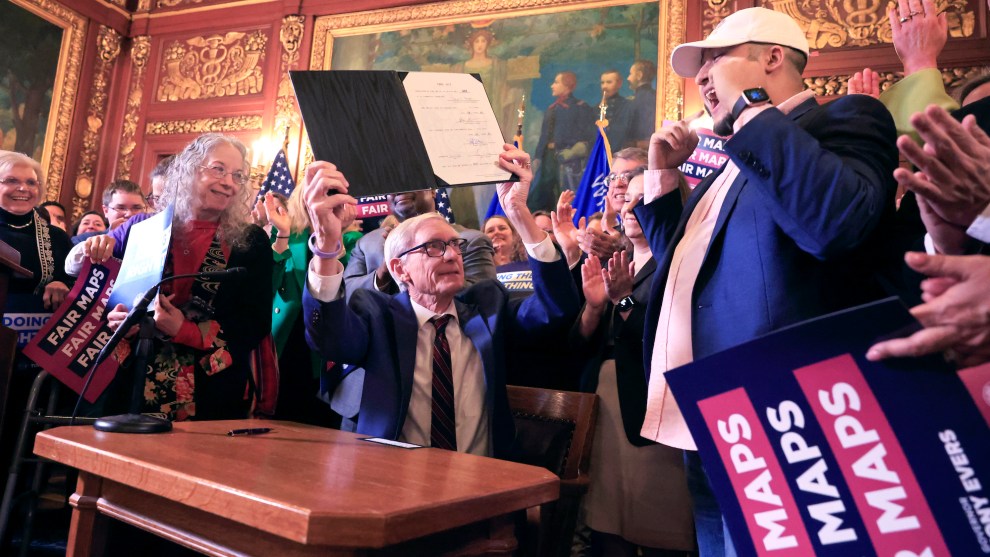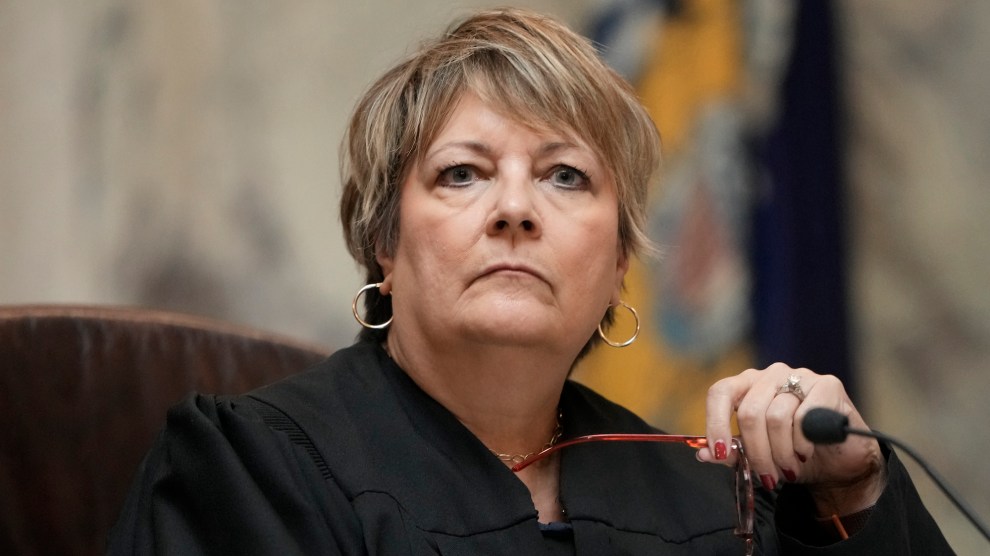
Wisconsin Gov. Tony Evers raises a bill which re-defines the state's legislative maps after signing it at the Wisconsin State Capitol in Madison, Wis., on Monday, Feb. 19, 2024. John Hart/Wisconsin State Journal via AP
The long era of Republican gerrymandering in Wisconsin may finally be coming to an end.
Last week, the Republican-controlled legislature approved new maps submitted by Democratic Governor Tony Evers that will significantly reduce GOP majorities in both chambers. Evers signed the legislation on Monday.
“It is a new day in Wisconsin, and today is a beautiful day for democracy,” Evers said at the state Capitol.
Republicans considered Evers’ maps the least bad option for them after the Wisconsin Supreme Court struck down the existing GOP-drawn lines in December and ordered new maps created. Some of the proposals before the court, which hired two independent experts to evaluate the submissions, could have given Democrats a majority in both chambers of the legislature.
“Republicans were not stuck between a rock and hard place,” said Republican state senator Van Wanggaard. “It was a matter of choosing to be stabbed, shot, poisoned, or led to the guillotine. We chose to be stabbed, so we can live to fight another day.”
Since 2011, Wisconsin has been one of the most gerrymandered states in the country. Democrats have won 14 of the past 17 statewide elections in Wisconsin, but Republicans control 64 of 99 seats in the state assembly and 22 of 33 seats in the state senate. The GOP holds a supermajority in the state’s senate and is just two seats short of a supermajority in the assembly, which would allow them to override Evers’ vetoes. These seemingly voter-proof majorities have allowed them to repeatedly thwart the will of a majority of the state’s voters while undercutting the victories of Democratic candidates.
Under Evers’ maps, the GOP edge would be reduced to 53-46 in the assembly and 17-16 in the senate, according to projections by Marquette University research fellow John Johnson based on 2022 election data, making the legislature far more competitive and reflective of the toss-up nature of the battleground state.
“It pains me to say it, but Governor Evers gets a huge win today,” said Republican Assembly Speaker Robin Vos.
Pro-democracy groups praised the rare instance of bipartisan agreement. “The maps are a significant improvement over the current, hyper-partisan gerrymandered Republican maps currently in place,” said Common Cause Wisconsin.
Yet many Democrats remained skeptical of the GOP’s motives for suddenly embracing Evers’ plan after voting nearly unanimously against them in the legislature. “If you believe that WI Republicans are planning to run on Gov. Evers’ maps in November, I have a bridge in Brooklyn to sell you,” said Democratic state senator Latonya Johnson.
Democrats speculated that Republicans passed Evers’ maps with little warning and no public hearings not just to prevent the Wisconsin Supreme Court, which now has a 4-3 progressive majority after the victory of Janet Protasiewicz last April, from choosing a map that is better for Democrats, but so that Republicans can challenge the new maps before the more conservative federal courts, specifically the Seventh Circuit Court of Appeals.
“If we get these new maps, the governor’s maps, signed by the Republicans, it’s more than likely that there’ll be a challenge in the 7th Circuit Court,” Wisconsin Democratic Congressman Mark Pocan told Democracy Docket.
But Evers ultimately decided that he could not pass up the opportunity to sign his own maps into law, regardless of the motives Republicans had in approving them.
“The long, dark night of ultra-partisan gerrymandering is over,” said Wisconsin Democratic Party chair Ben Wikler, “and a new day for democracy now dawns in the Badger State.”

















